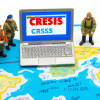
The internet has revolutionized various aspects of our everyday lives, and disaster management is no exception. Especially in recent years, this global network has risen to prominence as a powerful tool used in predicting, planning, managing, and even recovering from crises. This article showcases the multifaceted role of the internet in disaster management, which is commanding an increasingly strategic position in the face of global threats and crises.
Internet As a Tool for Disaster Prevention and Prediction
In the first place, the internet plays an instrumental role in disaster prediction and prevention. Advanced climate models, seismic data analysis, and comprehensive databases are making it possible for scientists, weather forecasters and geologists to predict natural disasters like storms, earthquakes, and hurricanes well before they occur. These predictions can then be disseminated quickly and efficiently via the internet, allowing for early planning and evacuation where necessary, ultimately reducing the detrimental impact of such events on human life and property.
Effective Communication During Disasters
During an actual disaster, the internet plays a crucial role as a communication tool. Open channels like social media, email, and instant messages serve as vital platforms for official bodies to issue important notices to the public, for rescue services to coordinate their efforts, and for people to request assistance or inform others of their safety. In addition, technology-powered surveillance systems enable real-time visualization of disaster-prone areas, aiding rescue services in allocating resources effectively and making critical decisions.
Post-Disaster Recovery
The internet's role in disaster management extends to the crucial period of recovery following a disaster. Online crowdfunding platforms can generate essential financial support for disaster-stricken areas, and digital fundraisers can be set up within a matter of minutes, reaching potential donors across the world. Moreover, online therapy and counselling services offer critical mental health support to those affected. Remote healthcare services are another important possibility opened up by the internet, with telemedicine being a lifesaver in areas where physical health resources are depleted.
The Internet and Disaster Education
Last but not least, the internet provides a valuable resource for public disaster education. Online training and awareness programs can effectively equip citizens with the important knowledge and skills to navigate emergency situations. By raising awareness about appropriate responses to various types of disasters, the internet can minimize panic and impaired judgment during crisis situations - a factor that is often just as damaging as the disasters themselves.
Future Implications
The role of the internet in disaster management is sure to become more important and complex in the future. As technology continues to evolve, innovative internet-powered solutions such as advanced AI, Big Data, and IoT devices are set to further revolutionize the field. However, it's crucial to ensure that these digital tools are accessible to all, as the digital divide could potentially amplify vulnerability to disasters among populations without access to the internet.
















